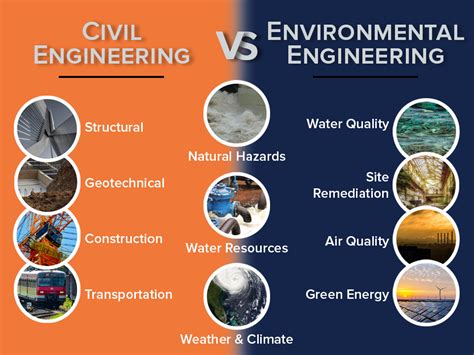Introduction
Environmental engineering and science intertwine seamlessly but distinctly in the battle against environmental degradation. While both fields share a common goal of protecting the environment, their approaches and emphases differ significantly. Understanding their unique roles is crucial for fostering sustainable solutions to pressing environmental challenges.

Environmental Science: Unraveling the Complexities of Nature
Environmental science delves deep into the intricacies of the natural world, exploring the interactions between living organisms and their surroundings. Scientists in this field investigate ecosystems, biodiversity, climate change, pollution, and resource management. Their primary focus is to understand the fundamental principles that govern environmental processes and how they impact human health and well-being.
Environmental scientists employ a wide range of methodologies, including field observations, laboratory experiments, modeling, and data analysis. They analyze environmental data, identify trends, and develop predictive models to forecast and mitigate potential threats. Their research contributes to a comprehensive understanding of the complex interplay between natural and human systems.
Environmental Engineering: Translating Knowledge into Action
Environmental engineering applies scientific principles to design and implement solutions that address environmental challenges. Engineers in this field focus on practical applications to protect human health, the environment, and natural resources. They specialize in fields such as water treatment, wastewater management, air pollution control, solid waste disposal, and renewable energy systems.
Environmental engineers utilize their knowledge of engineering principles, materials, and technologies to create innovative solutions. They design, build, and maintain infrastructure systems that minimize pollution, conserve resources, and protect human health. Their expertise is vital for ensuring a sustainable and livable environment.
Key Differences between Environmental Engineering and Science
| Characteristic | Environmental Science | Environmental Engineering |
|---|---|---|
| Focus | Understanding environmental processes | Applying scientific knowledge to solve environmental problems |
| Methods | Observation, research, modeling | Design, implementation, construction |
| Outcome | Knowledge about the environment | Practical solutions to environmental challenges |
Convergence and Collaboration: A Path to Innovation
Despite their distinct approaches, environmental engineering and science are closely interconnected and often collaborate to develop comprehensive solutions. Scientists provide the fundamental understanding, while engineers translate that knowledge into actionable solutions.
This convergence is particularly evident in emerging fields such as sustainable development and green technology. Environmental engineers are designing innovative technologies for renewable energy generation, wastewater treatment, and pollution control. Meanwhile, environmental scientists are studying the environmental impacts of these technologies and developing strategies to minimize their negative effects.
Benefits of Environmental Engineering and Science
Environmental Engineering
- Provides clean and safe drinking water
- Protects against air pollution and its adverse effects on health
- Manages solid waste and reduces environmental contamination
- Develops renewable energy sources to mitigate climate change
- Monitors and mitigates environmental hazards
Environmental Science
- Identifies and quantifies environmental risks
- Develops scientific evidence for environmental regulations
- Facilitates informed decision-making on environmental issues
- Provides the knowledge base for environmental stewardship
- Raises awareness about environmental conservation
Future Applications of Environmental Engineering and Science
The field of environmental engineering and science is constantly evolving to meet the challenges of a changing planet. Novel applications include:
- Environmental forensics: Investigating environmental crimes and identifying responsible parties
- Ecotoxicology: Studying the effects of environmental pollutants on living organisms
- Environmental nanotechnology: Developing nanoscale materials and technologies for environmental remediation
- Green infrastructure: Integrating natural systems into urban environments to improve air and water quality, mitigate flooding, and promote biodiversity
- Climate engineering: Exploring innovative technologies to mitigate climate change
FAQs: Deciphering Environmental Engineering vs. Science
1. What is the primary goal of environmental engineering and science?
To safeguard the environment, human health, and natural resources.
2. How do environmental scientists differ from environmental engineers?
Scientists focus on understanding environmental processes, while engineers apply scientific knowledge to solve environmental problems.
3. Why are environmental engineering and science important for society?
They provide solutions to critical environmental challenges, such as water pollution, air pollution, and climate change.
4. How can individuals contribute to environmental engineering and science?
By reducing their carbon footprint, conserving water and energy, and supporting sustainable practices.
5. What are the career opportunities in environmental engineering and science?
Environmental consultants, environmental scientists, engineers in various industries, researchers, and policymakers.
6. What are the ethical implications of environmental engineering and science?
Ensuring equity and justice in environmental decision-making, considering the long-term consequences of engineering solutions, and promoting sustainable practices.
7. How can environmental engineering and science mitigate the impacts of climate change?
By developing renewable energy technologies, promoting energy efficiency, and implementing carbon capture and storage systems.
8. What are the latest technological advancements in environmental engineering and science?
Advances include biosensors for water quality monitoring, artificial intelligence for environmental modeling, and bioremediation techniques for soil and groundwater cleanup.
Conclusion
Environmental engineering and science play indispensable roles in safeguarding our planet and ensuring a sustainable future. While science provides the fundamental understanding of environmental processes, engineering translates that knowledge into actionable solutions. By combining their expertise, these fields can tackle pressing environmental challenges, mitigate the impacts of climate change, and secure the well-being of generations to come.
